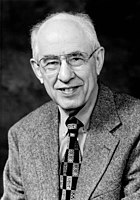
Photo from wikipedia
Abstract We present a criterion for the use of thought experiments as a guide to possibilia that bear on important arguments in philosophy of religion. We propose that the more… Click to show full abstract
Abstract We present a criterion for the use of thought experiments as a guide to possibilia that bear on important arguments in philosophy of religion. We propose that the more successful thought experiments are closer to the world in terms of phenomenological realism and the values they are intended to track. This proposal is filled out by comparing thought experiments of life after death by Peter van Inwagen and Dean Zimmerman with an idealist thought experiment. In terms of realism and values we contrast an exemplary thought experiment by Iris Murdoch with one we find problematic by William Irwin.
Journal Title: Open Theology
Year Published: 2017
Link to full text (if available)
Share on Social Media: Sign Up to like & get
recommendations!